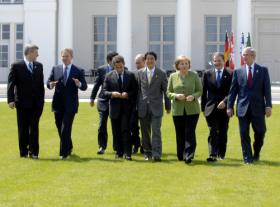Leaders of the Group of Eight (G8) industrialised nations reached agreement on text relating to climate change, energy efficiency and energy security at their 6-8 June summit in Heiligendamm, Germany.
 Leaders agreed that "resolute and concerted international action is urgently needed in order to reduce global greenhouse gas emissions and increase energy security." They also agreed that strong economies are needed to "slow, stabilize and then significantly cut global emissions of greenhouse gases," although did not commit to it. Furthermore, the leaders did not commit to any specific targets on greenhouse gas emissions reductions, merely repeating the UNFCCC target of stabilizing greenhouse gas concentrations at a level that would prevent dangerous interference with the climate system.
Leaders agreed that "resolute and concerted international action is urgently needed in order to reduce global greenhouse gas emissions and increase energy security." They also agreed that strong economies are needed to "slow, stabilize and then significantly cut global emissions of greenhouse gases," although did not commit to it. Furthermore, the leaders did not commit to any specific targets on greenhouse gas emissions reductions, merely repeating the UNFCCC target of stabilizing greenhouse gas concentrations at a level that would prevent dangerous interference with the climate system.
Amongst a broad range of measures given as examples of how to reduce greenhouse gas emissions was text recalling previous G8 agreements that noted that some of the group believed that the continued development of nuclear energy would "contribute to global energy security, while simultaneously reducing harmful air pollution and addressing the climate change challenge."
The G8 members also said that they were committed to the paramount importance of safety, security and non-proliferation in using nuclear power. The G8 Nuclear Safety and Security Group (NSSG) will continue in its work to consider nuclear safety and security issues.
The G8's membership is: Canada, France, Germany, Italy, Japan, Russia, the UK and the USA. All countries developed nuclear energy sectors, but Italy chose to shut its nuclear power plants quickly after a 1987 referendum while in 2001 Germany began a more gradual phase out that would see all plants close by 2015.
Further information
G8 Summit Heiligendamm: Growth and responsibility in the world economy
WNA's Global Warming - Policy Responses information paper














